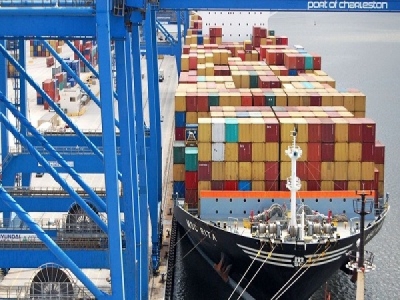
Posted on September 11, 2016
By Emma Dumain, The Post and Courier
U.S. Rep. Mark Sanford, R-S.C., is spearheading an effort to pressure House Republican leaders to prioritize passage of a water infrastructure bill by the end of September.
A failure to send the Water Resources and Development Act, or WRDA, to the president’s desk before the end of the federal fiscal year could jeopardize progress on deepening Charleston Harbor.
Authorization to proceed with the $509 million dredging project is included in the bill, and the approval is required before federal funds can be appropriated, possibly as early as the next fiscal year.
Sanford, with U.S. Rep. Lois Frankel, D-Fla., is circulating among House colleagues a draft letter to leadership. As of Thursday afternoon, at least 113 lawmakers from both sides of the aisle had signed it, including South Carolina Republicans Jeff Duncan, Joe Wilson and Tom Rice. U.S. Rep. Mick Mulvaney, R-S.C., plans to sign it, too.
“Allocating floor time for the Water Resources Development Act would … reflect a bipartisan commitment to invest in our water infrastructure and promote environmental restoration,” reads draft language, obtained by The Post and Courier.
Video: Do GOP lawmakers trust Donald Trump with nukes?
The State Ports Authority is pushing to get the harbor’s shipping channel deepened to about 52 feet as quickly as possible in order to accommodate the bigger, heavier cargo vessels that are becoming more commonplace.
Jim Newsome, president and CEO of the Charleston-based maritime agency, said a delegation of state legislators from the Greenville area on Thursday expressed support for the bill to House Speaker Paul Ryan directly. A Ryan spokeswoman confirmed the Wisconsin Republican sat in on a meeting with the South Carolinians as they visited with their Congressman, Republican Trey Gowdy, on Capitol Hill.
The push on the House side of the Capitol to move WRDA through the legislative pipeline comes as the U.S. Senate is plodding through its version of the bill amid some grumbling. Congress has just returned to work from a seven-week recess, and now has just three weeks left before another month-long break to prepare for Election Day. During this short window, lawmakers must agree on a stopgap bill to avoid a government shutdown when federal spending expires Sept. 30.
It’s unclear how both chambers will reconcile language in the Senate’s WRDA bill that would provide federal aid to Flint, Mich., still reeling from its contaminated drinking-water supply. House Transportation and Infrastructure Chairman Bill Shuster, R-Pa., has said previously that the issue is not germane to the underlying legislation.
Meanwhile, Democrats want the few remaining days on the month’s calendar to be spent on items Republicans don’t want to pursue, such as confirming Supreme Court Justice nominee Merrick Garland and voting on a “clean” bill to combat Zika. For legislators representing regions relatively unaffected by WRDA, the legislation seems like a waste of time.
It might be the case that Congress passes WRDA in November and December, during the so-called “lame duck” session. In that event, there are some work-arounds South Carolina officials could pursue at the local level to make sure the Charleston Harbor dredging isn’t held up.
Newsome of the SPA said he’d prefer that Congress act before the November election.
“We don’t want to be dependent on a lame-duck session, because we don’t know what’s going to happen … who’s out and who’s in,” he said, adding the ports authority “really would like to see it done in September.
“We need the Senate and the House to concur and conference this bill so we can get authorized this year.” Newsome said.
The timing is critical because the federal budget process starts in February and the ports authority would like to have authorization out of the way so the next president can include money for dredging in his or her budget.
U.S. Sen. Lindsey Graham, R-S.C., told The Post and Courier on Thursday it wouldn’t be catastrophic if Congress waited until after the election to advance the bill, even if that wasn’t desirable, but passage by the year’s end was nonnegotiable.
“The authorization to go to the construction phase would not be there,” he said. “We’d have to come up with some other way to authorize construction and that would be problematic. It would be very bad.”
Newsome said the dredging project, now scheduled for completion in 2019, could face a year-long delay if the WRDA isn’t approved this year.
U.S. Sen. Jim Inhofe, R-Okla., the chairman of the Senate committee of jurisdiction over WRDA, said he wasn’t concerned that there wouldn’t be a resolution. “The House is not going to want to be an obstacle to keep this from happening.”
Source: The Post and Courier





